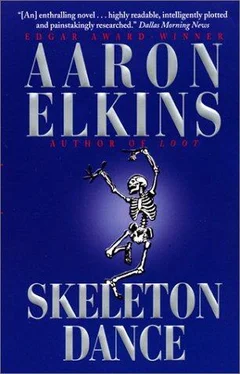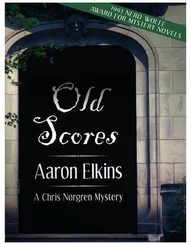Aaron Elkins - Skeleton dance
Здесь есть возможность читать онлайн «Aaron Elkins - Skeleton dance» весь текст электронной книги совершенно бесплатно (целиком полную версию без сокращений). В некоторых случаях можно слушать аудио, скачать через торрент в формате fb2 и присутствует краткое содержание. Жанр: Классический детектив, на английском языке. Описание произведения, (предисловие) а так же отзывы посетителей доступны на портале библиотеки ЛибКат.
- Название:Skeleton dance
- Автор:
- Жанр:
- Год:неизвестен
- ISBN:нет данных
- Рейтинг книги:5 / 5. Голосов: 1
-
Избранное:Добавить в избранное
- Отзывы:
-
Ваша оценка:
- 100
- 1
- 2
- 3
- 4
- 5
Skeleton dance: краткое содержание, описание и аннотация
Предлагаем к чтению аннотацию, описание, краткое содержание или предисловие (зависит от того, что написал сам автор книги «Skeleton dance»). Если вы не нашли необходимую информацию о книге — напишите в комментариях, мы постараемся отыскать её.
Skeleton dance — читать онлайн бесплатно полную книгу (весь текст) целиком
Ниже представлен текст книги, разбитый по страницам. Система сохранения места последней прочитанной страницы, позволяет с удобством читать онлайн бесплатно книгу «Skeleton dance», без необходимости каждый раз заново искать на чём Вы остановились. Поставьте закладку, и сможете в любой момент перейти на страницу, на которой закончили чтение.
Интервал:
Закладка:
"Hm? Oh, sorry. Sure, that sounds fine."
"What sounds fine?"
He cleared his throat. "What you said."
She put down the brochure. "What are you working on, anyway-the book?
The Book. Bones to Pick: Wrong Turns, Dead Ends, and Popular Misconceptions in the Study of Humankind. It had grown out of a public lecture he'd given a year earlier at the university, part of a survey-of-the-sciences extension series. His presentation, "Error, Gullibility, and Self-Deception in the Social Sciences," had been attended by Lester Rizzo, the executive editor of Javelin Press, who had approached Gideon afterward to ask if he would be interested in expanding the subject and turning it into a book for publication under Javelin's "Frontiers of Science" imprint.
Gideon had agreed, partly because he was flattered at the idea of joining the roster of distinguished scientists who had already contributed to the series, partly because he was looking for something different to do on his upcoming sabbatical, and partly because almost anything that was still ten months away from doing was likely to seem like a pretty do-able idea, whatever it was. The $15,000 advance-ready money, up front; a startlingly original concept to anyone accustomed to writing for the academic presses-hadn't hurt either. Even Lester's first editorial suggestion-the first of many ("You're writing for the masses here. What do you say we dumb down the title a little?") -hadn't put him seriously off; surely Lester knew more about selling books than he did. So stifling his natural reservations, he'd gone along with it, although not as far as Lester would have liked ( Bungles, Blunders, and Bloopers). Hence Bones to Pick, a reasonable compromise.
He nodded, filling their glasses from the bottle of Merlot. "Yeah, the book. I've been stuck on the same section for two days. I can't figure out how to get into it."
"What section is it?"
"You want Lester's title or mine?"
"Yours."
"'The Case of the Neologistically Prolix Hyperboreans.'" He smiled. "What do you think?"
She made a face. "Well, to tell the truth…"
"Julie, it's meant to be amusing, for Christ's sake."
"Oh. And Lester's version?"
"'The Myth of the Eskimos' Two Dozen Words for Snow,'" he said testily. "Something like that." He cut a few more slices from the loaf of French bread, loading them with wedges of Gorgonzola, and arranging them on the plate.
"Well, don't get mad, but I have to admit that I like Lester's version better. " Not," she added quickly, "that it's as amusing as yours, of course, but-hey, wait a minute-the myth of the Eskimos' two dozen words for snow? You mean they don't have them? Separate words for dry snow, and wet snow, and slushy snow-"
"Not two dozen, not fifty, not nine, not forty-eight, and not two hundred and two-each of which has been reported by 'authorities,' most of whom probably know as much Eskimo as I do."
"But… well, how many do they have?"
"Ah, you see, that's the hard part. Maybe two, maybe a hundred, depending on whether you're thinking of Inuit or Yupak, or whether you're counting lexemes, or morphemes, or derived-"
"Careful, you're losing me. To say nothing of the waiting masses."
"Look, the important thing is, it doesn't matter, it doesn't prove anything. However many they have, it's no big deal. Look at it this way: How many words do we have for water?"
"Well, I was going to say one, but now I think I'd better wait and see."
"Good move. What about 'ice?' 'Fog?' 'Mist?' 'Snow,' for that matter?"
"Yes, I guess if you want to stretch a point-"
"But it's not stretching a point. They all stand for water in different forms. And what about 'river,' 'stream,' 'brook,' 'creek,' 'eddy'? They all mean water-water moving at different rates in different conditions."
"And you're saying that's the kind of thing the Eskimos do for snow?"
"Sure. And if some Eskimo linguist studied us, he'd probably say English is amazing: separate, completely independent words for standing-water-in-large quantities, standing-water-in-medium-sized-quantities, standing-water-in-small-quantities-"
She wrinkled her nose. "Hold on now…"
"'Ocean,' 'lake,' and 'pond,'" he said. "We even have one for standing-water-in-teeny-weeny-quantities."
"Mmm…" Thinking, she stared out the window. "Puddle?"
"Now you're catching on, see?"
"Yes, I'm starting to. It's interesting. Now, what's your problem, exactly?"
"I can't seem to come up with a simple way of starting."
"Why don't you write what you just said? The whole bit, from the beginning?"
He looked at her. "That's a good idea, I will." But his face, which had momentarily cleared, fell. "What did I say?"
"Sorry," she said, "if I'd realized you weren't paying attention I'd have taken notes."
"God help me," he wailed, but he was laughing.
He was laughing more these days, she noted with pleasure. Not that he'd ever been ill-humored; far from it. But over the last year or so she'd begun to sense a lessening of verve, of the essential liveliness and interest in everything that had always been such a big part of him. She'd pondered on the possibilities of midlife crisis (he was 44), of career dissatisfaction (he was a full professor at the University of Washington's Port Angeles campus; where did he go from there?), and even-but only briefly and when she was in one of her own rare periods of insecurity-of boredom with their marriage.
It had taken her a while, but in the end she'd put her finger on it: it was Port Angeles itself, the remote, one-time lumbering town on the far side of the Olympic Peninsula, where the university, in an effort to be ready for the sure-to-come population expansion from Seattle, had built a well-endowed, full-scale campus. The problem was that they had gotten there a bit too early. Port Angeles was a lively, attractive town in a glorious location, but a cultural center-a city-it wasn't; not yet. And Gideon, she had belatedly realized after five years of marriage, was a city person through and through, born and bred in Los Angeles. He had taken the Port Angeles position, an associate professorship at the time, largely for her sake, so that she could continue working with ease at Olympic National Park.
He'd never once complained; indeed, in many ways it was obvious that he loved the place-the clean air, the nearby Olympic Mountains, the startlingly beautiful Alpine lakes tucked into pristine green valleys, the laid-back atmosphere of the university campus. But no opera, no real theater or museums, no fine restaurants, no Mariner games. To get to any of those meant a four-hour round trip by highway, bridge, and ferry boat, and when the weather was bad, a pretty common occurrence in these parts, it meant a night spent in a Seattle hotel and a pre-dawn start home the next day if it happened to be a workday. And so, little by little, they'd pretty much stopped going, except for the occasional university event at the main campus. That had suited her fine; she was a country girl at heart, never at her best in cities. But, she had only recently come to realize, it hadn't suited him.
And so when the opportunity had been offered him to join the faculty at the main campus in Seattle-he'd turned down a similar chance once before-she had encouraged him to accept, and this time he had, and they had moved to Bainbridge Island, still on the Olympic Peninsula side of the Sound but only six miles from downtown Seattle, a comfortable 35-minute ferry ride. She had pushed for the move in an open-hearted spirit of self-sacrifice-it would mean a ninety-minute drive to work for her each way instead of her former ten-minute walk, but she'd found that it was a good thing for her too. Her drive was beautiful and uncrowded, a relaxing, mind-clearing ramble over the Hood Canal bridge, through grand, fragrant forests of Douglas fir, and along the lush flanks of the Olympics all the way to Port Angeles. With a new flex-time arrangement, she went in only four days a week now. And she and Gideon were now getting into the city a couple of times a week for one thing or another-and, except for the one night the ferries had stopped running because of the high seas, they had been getting home the same night regardless of the weather.
Читать дальшеИнтервал:
Закладка:
Похожие книги на «Skeleton dance»
Представляем Вашему вниманию похожие книги на «Skeleton dance» списком для выбора. Мы отобрали схожую по названию и смыслу литературу в надежде предоставить читателям больше вариантов отыскать новые, интересные, ещё непрочитанные произведения.
Обсуждение, отзывы о книге «Skeleton dance» и просто собственные мнения читателей. Оставьте ваши комментарии, напишите, что Вы думаете о произведении, его смысле или главных героях. Укажите что конкретно понравилось, а что нет, и почему Вы так считаете.












